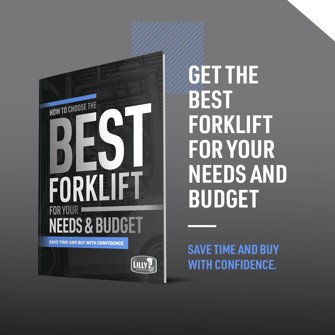4 min read
How to Buy the Best Forklift for Your Work Environment
John Wofford
Nov 20, 2020 5:15:00 PM
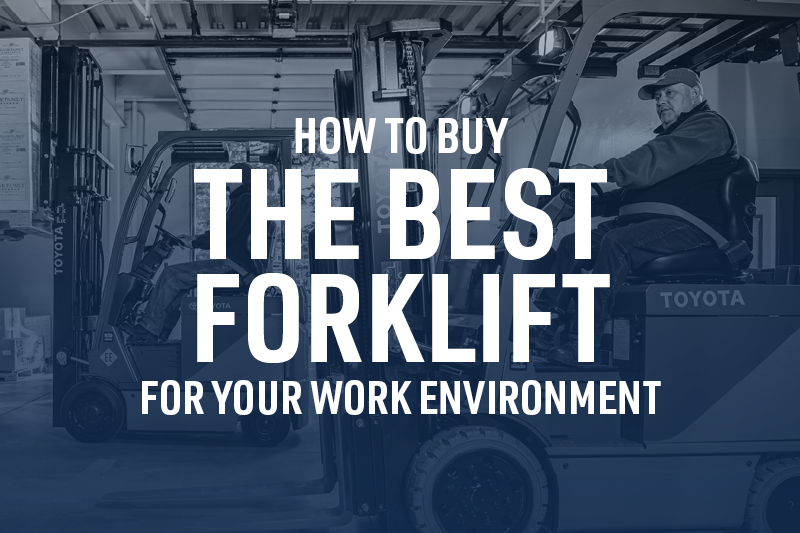
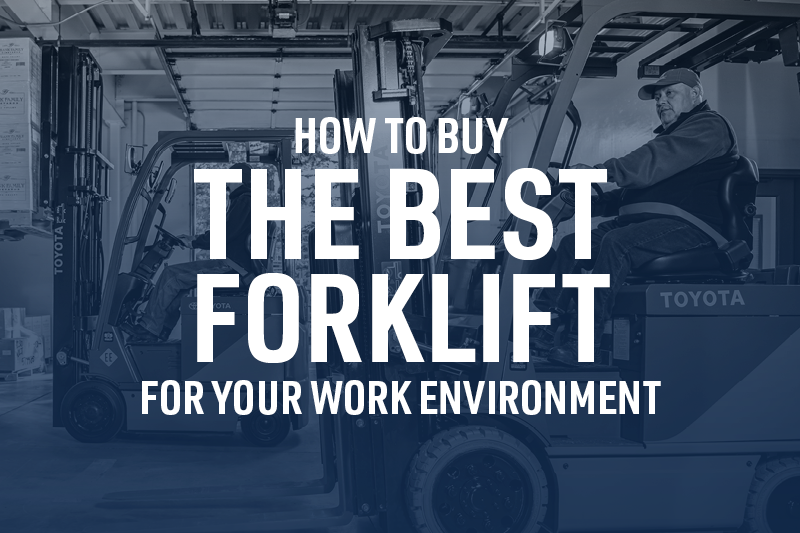
Buying a forklift can be overwhelming. There are so many options to sort through: stand-up vs. sit-down, different fuel types, cushion tires, pneumatic tires and so on.
A forklift expert can help you quickly narrow down the best options, but if you’re the sort of person who likes to do their homework before speaking to someone, we understand. Here’s a detailed breakdown of the different types of forklifts and how to choose the best one for your work environment.
Forklift Classifications
All powered industrial trucks (including forklifts) fall into one of 7 official classifications designated by OSHA. Classes I-IV are typically considered “indoor” units, while Classes V-VII are considered “outdoor” units. Your facility and the driving environment will play a critical part in deciding what type of forklift you need.
- Class I: Electric Motor Riders
- Class II: Electric Motor Narrow Aisle
- Class III: Electric Motor Hand Trucks or Hand/Rider Trucks
- Class IV: IC (Internal Combustion) Engine Trucks with cushion tires
- Class V: IC Engine Trucks with pneumatic tires
- Class VI: Electric and IC Engine Tractors
- Class VII: Rough Terrain Forklift Trucks
If some of the descriptions above leave you scratching your head, below is a list of the common names associated with the forklift classes mentioned above:
- Class I: Sit-down electric forklifts and stand-up counterbalance lifts.
- Class II: Electric order pickers and reach trucks
- Class III: Electric walkies, walkie riders, walkie stackers, walkie tow tractors and tuggers
- Class IV: Sit-down forklifts with cushion tires and IC engines
- Class V: Sit-down forklifts with pneumatic tires and IC engines
- Class VI: Large, airport-style tuggers, which could be IC or electric.
- Class VII: Rough-terrain forklifts often used in construction and lumber applications
Cushion Vs. Pneumatic Forklifts
You’ve likely seen forklifts for sale with names like “Electric Pneumatic” or “Mid IC Cushion.” These names tell you the forklift’s fuel type (electricity vs. LP gas or other petroleum product) and the type of tires the forklift uses (pneumatic vs. cushion). These naming conventions help forklift buyers know, at a glance, if this forklift is right for their application.
How do you know if you need an electric vs. LP gas forklift or pneumatic instead of cushion tires? Your work environment is a significant factor.
As a quick rule of thumb:
- If the forklift will primarily operate outdoors, an IC forklift with pneumatic tires is probably* the best option.
- For primarily indoor applications, you have a few more options. Generally, you can get sit down rider lifts, stand up rider lifts, or walk behind lifts, depending on how your warehouse is laid out. For most general warehousing applications, a sit-down electric or LP gas forklift with cushion tires is the most common choice.
*We say “probably” because there are rugged electric forklifts designed to work outdoors, and electric forklifts have a much lower lifetime cost of ownership. Talk to a forklift expert who can help you decide if this is the best choice for you.
Different Types of Forklift Tires
The two primary types of forklift tires on sit-down lifts are cushion tires and pneumatic tires. There are other types of tires, but they will generally fall under one of these two main categories.
It’s important to remember that forklift tire types are not interchangeable. You can use different types of cushion tires on your forklift, but you can’t switch from cushion tires to pneumatic (or vice versa).
Pneumatic Forklift Tires - Best for Outdoor or Rough Terrain
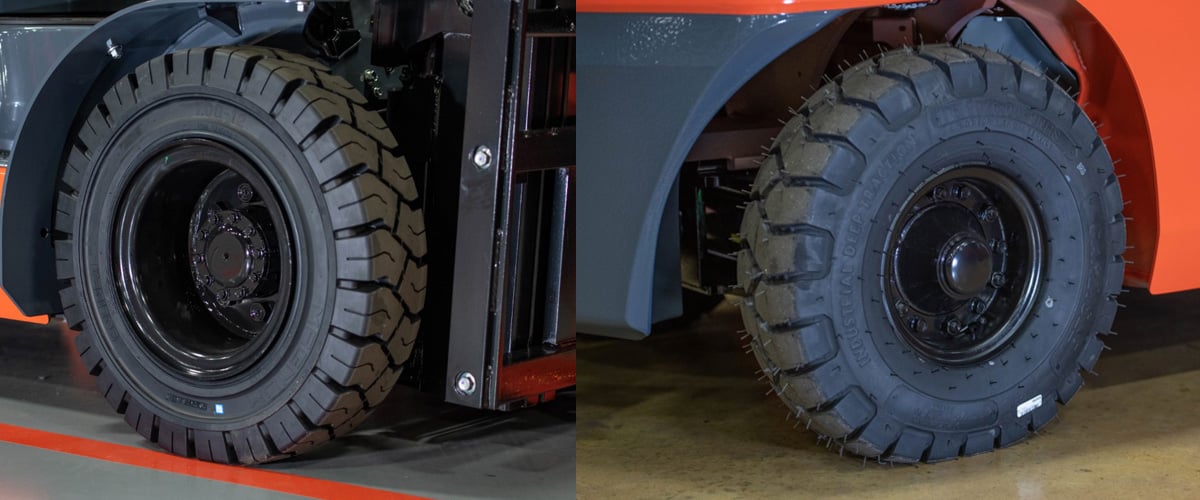
Pneumatic tires resemble car or truck tires, and are designed for outdoor use. They have a much thicker tread compared to cushion tires, so they can:
- Absorb the shock of uneven terrain
- Endure damage from sharp objects
- Last significantly longer than cushion tires
- Provide better traction on slippery, loose, or uneven surfaces
Different Types of Pneumatic Forklift Tires
There are three main types of pneumatic tires: air pneumatics, filled pneumatics and solid pneumatics.
Air-Pneumatic Forklift Tires
Air-pneumatic tires are made of robust, long-lasting rubber and are filled with air (just like car and truck tires). These tires are a good choice for most outdoor applications; but, if shards of glass, metal, nails or other sharp objects are common around your facility, choose solid pneumatic tires instead.
Filled Pneumatic Forklift Tires
Filled pneumatic tires are truthfully just air-pneumatics with something inside of them rather than air. The most common filling is a special foam used so that if the tire is punctured, you do not have to deal with a flat tire. This may sound like a small thing, but trust us - you do not want to mess with changing out a forklift tire if you don’t have to.
Solid Pneumatic Forklift Tires
Solid pneumatic forklift tires - you’ve guessed it - are made out of solid rubber. They are the most common tires on the market.
Unlike air-filled pneumatic tires, solid pneumatic tires can’t be punctured or deflated. Solid pneumatic tires also have steel bead wires on the shoulder, followed by a hard rubber compound and a nylon carcass that protects against damage. The exterior part of the tire is made with an abrasion-resistant rubber, and a soft rubber core reduces operator fatigue by minimizing shock and vibration.
Cushion Forklift Tires - Best for Indoor Applications
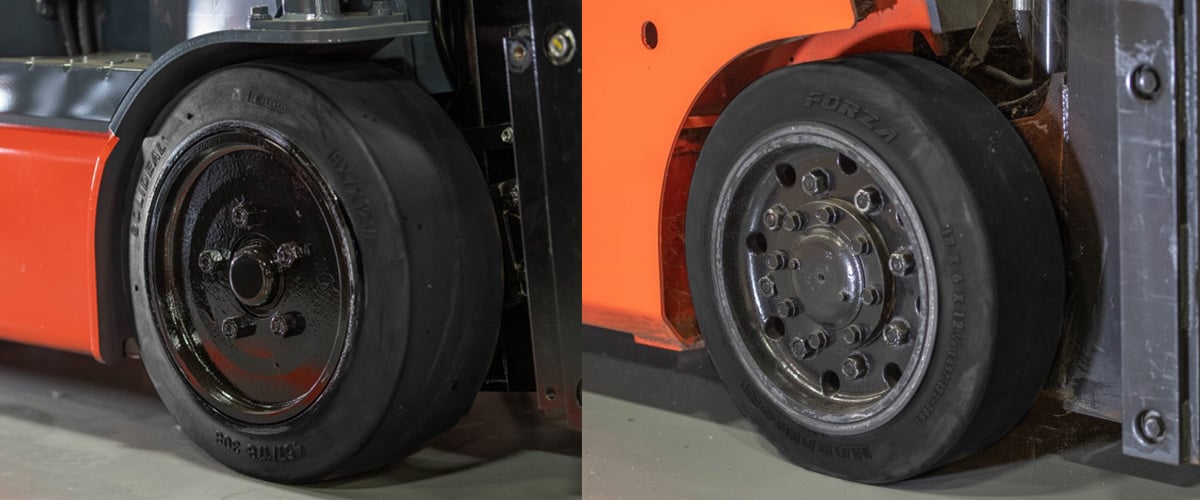
Cushion tires are made of solid rubber fitted around a metal band and come with either a smooth or traction tread. Cushion tires are also known as press-on tires because the tires are pressed directly onto the wheel. If you’ve ever seen black marks on warehouse floors, they may have been from cushion forklift tires (non-marking tires are available).
Cushion tires:
- Prevent wear and tear on warehouse floors
- Are easier to maintain and replace
- Provide a safe and comfortable ride for a forklift operator
- Sit lower to the ground - allowing for a tighter turning radius
- Can fit a smaller forklift frame (useful in facilities with narrow aisles)
- Typically cost less than pneumatic tires
Non-Marking Forklift Tires
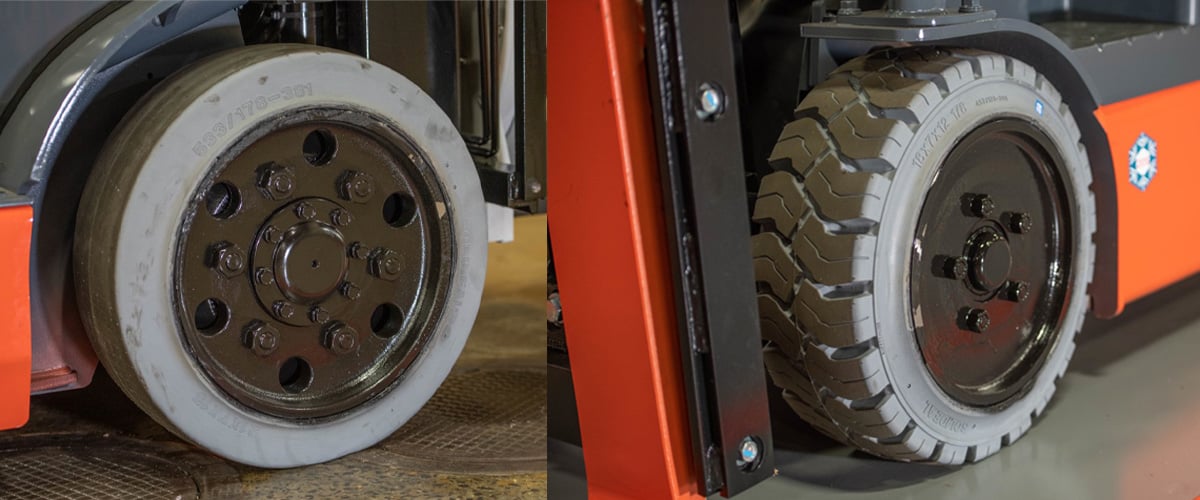
Non-marking tires are available for pneumatic, solid pneumatic, and cushion tires. Instead of carbon black, they are made with special additives so they won’t leave black marks on your floors. If you use non-marking forklift tires, you’ll also need to buy an anti-static ground strip to prevent static electricity build-up.
Buyer beware: non-marking tires wear much faster than traditional black rubber ones. They may not leave marks on the ground, but they sure can on your wallet.
Make the Right Forklift Choice for Your Work Environment
Now that you know forklift classifications and different types of forklift tires, we hope you’re one step closer to finding the right forklift. If you have additional questions about forklifts or other material handling equipment, we hope you’ll contact one of our forklift experts.
Connect with us online, by phone at 800-238-3006, or visit one of our 13 locations across the mid-South. The Lilly Company serves customers throughout Alabama, Mississippi, Tennessee, and eastern Arkansas.
Arkansas – Jonesboro
Alabama - Birmingham, Dothan, Irondale, Madison, Mobile, and Montgomery
Mississippi - Tupelo and Richland
Tennessee - Jackson, Kingsport, Knoxville, and Memphis
Posts by Tag
- Forklift (61)
- Forklift Service (19)
- Electric Forklifts (16)
- Forklift Safety (14)
- Forklift Attachments (12)
- Toyota Forklifts (12)
- Warehouse Planning (10)
- Parts (9)
- Warehouse Automation (8)
- Clark Forklifts (7)
- Loading Docks (7)
- Material Handling Education (7)
- Pallet Racking (7)
- Customer Solutions (6)
- Forklift Batteries (6)
- Forklift Rental (6)
- Purchasing Options (6)
- Aerial Equipment (5)
- Heavy Equipment (5)
- Forklift Accessories (4)
- Forklift Fleet Management (4)
- Forklift Tires (4)
- Forklift Training (4)
- Products (4)
- Utility Vehicles (4)
- Yard Spotter Trucks (4)
- Linde (3)
- Pallet Jacks (3)
- Specialty Forklifts (3)
- Used Equipment (3)
- IC Forklifts (2)
- Manitou (2)
- Warehouse Doors (2)
- COMBiLift (1)
- Custom Shop (1)
- Forklift Brakes (1)
- Forklift Warranty (1)
- Gehl (1)
- Komatsu (1)
- Product Review (1)
- Recruitment (1)











